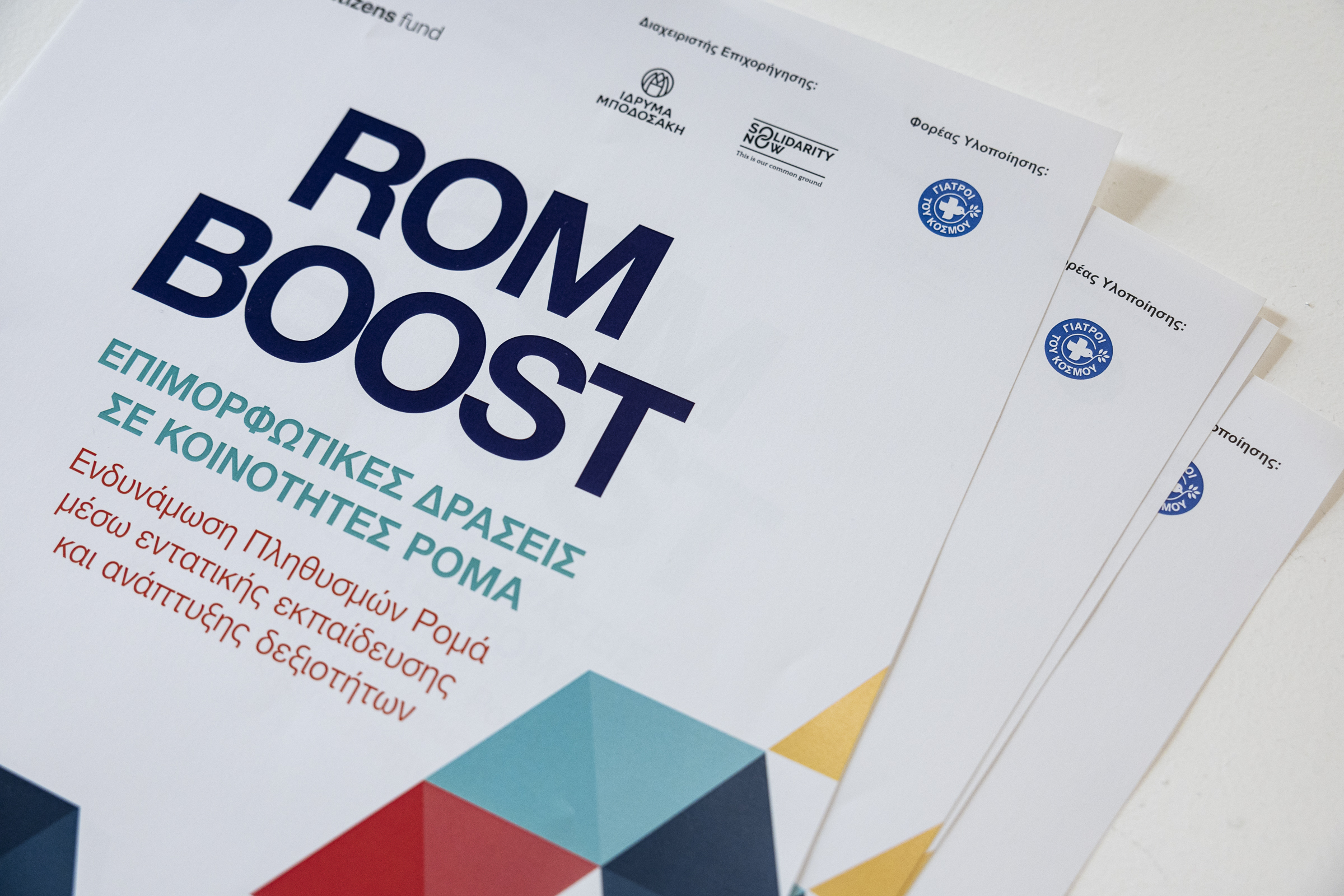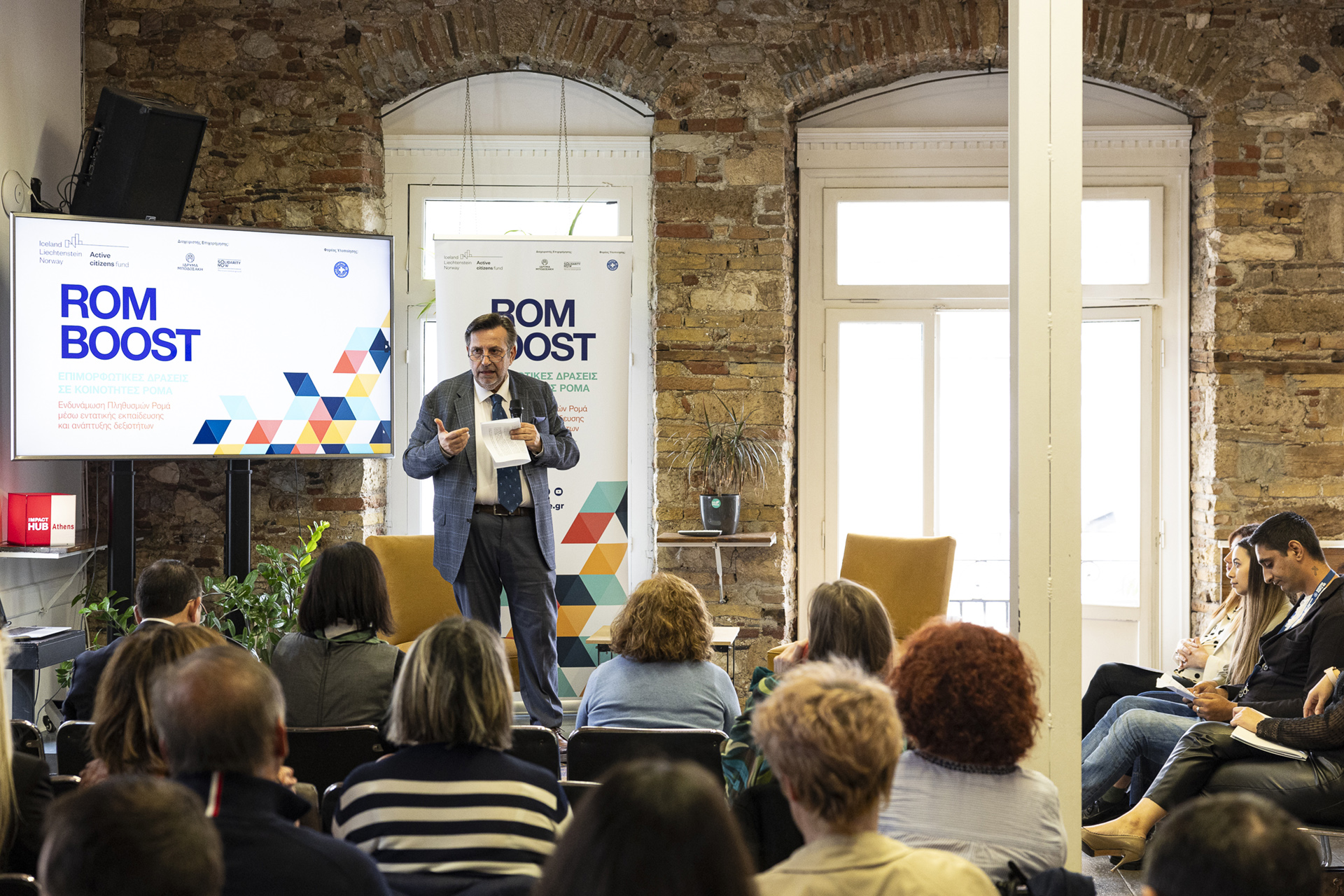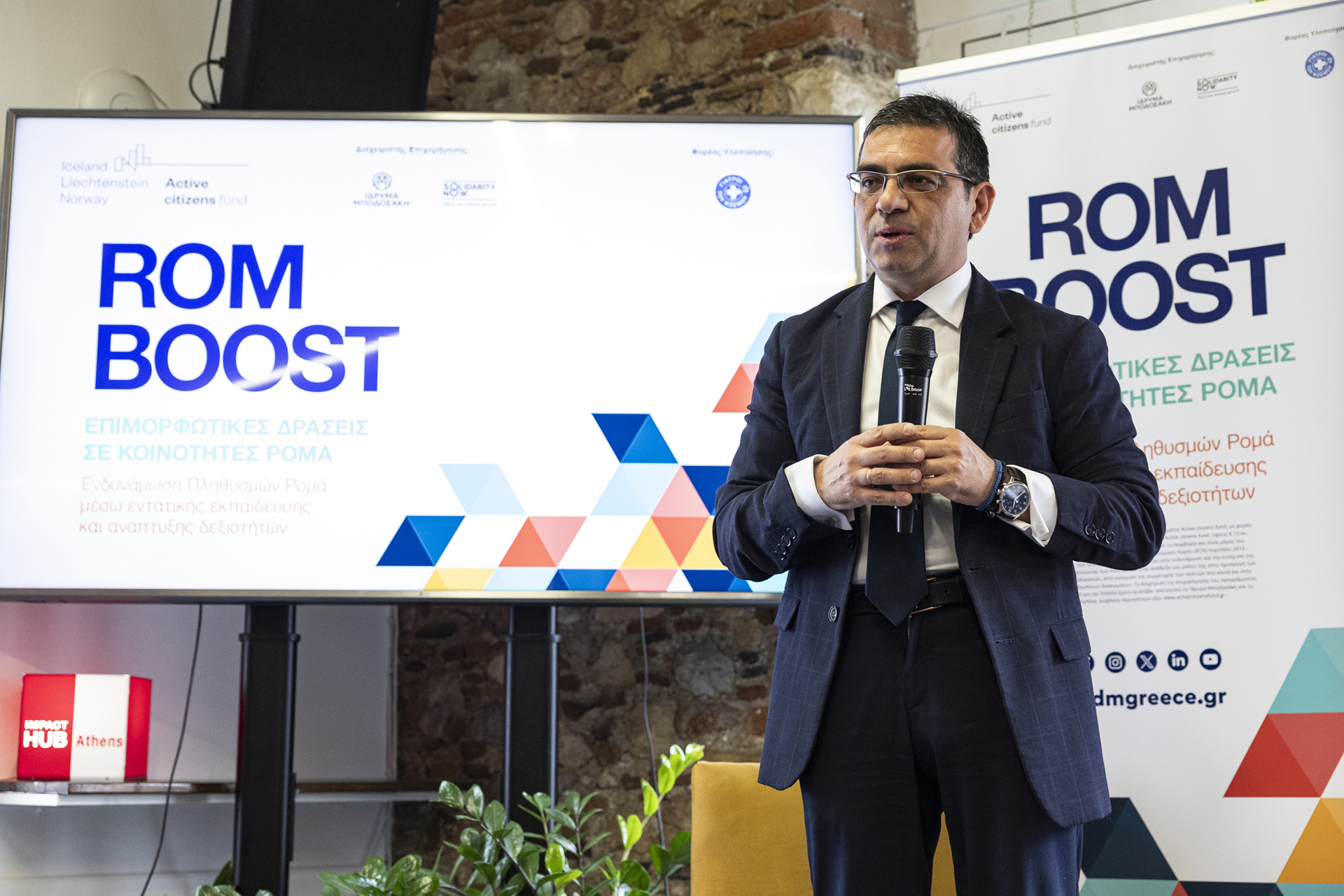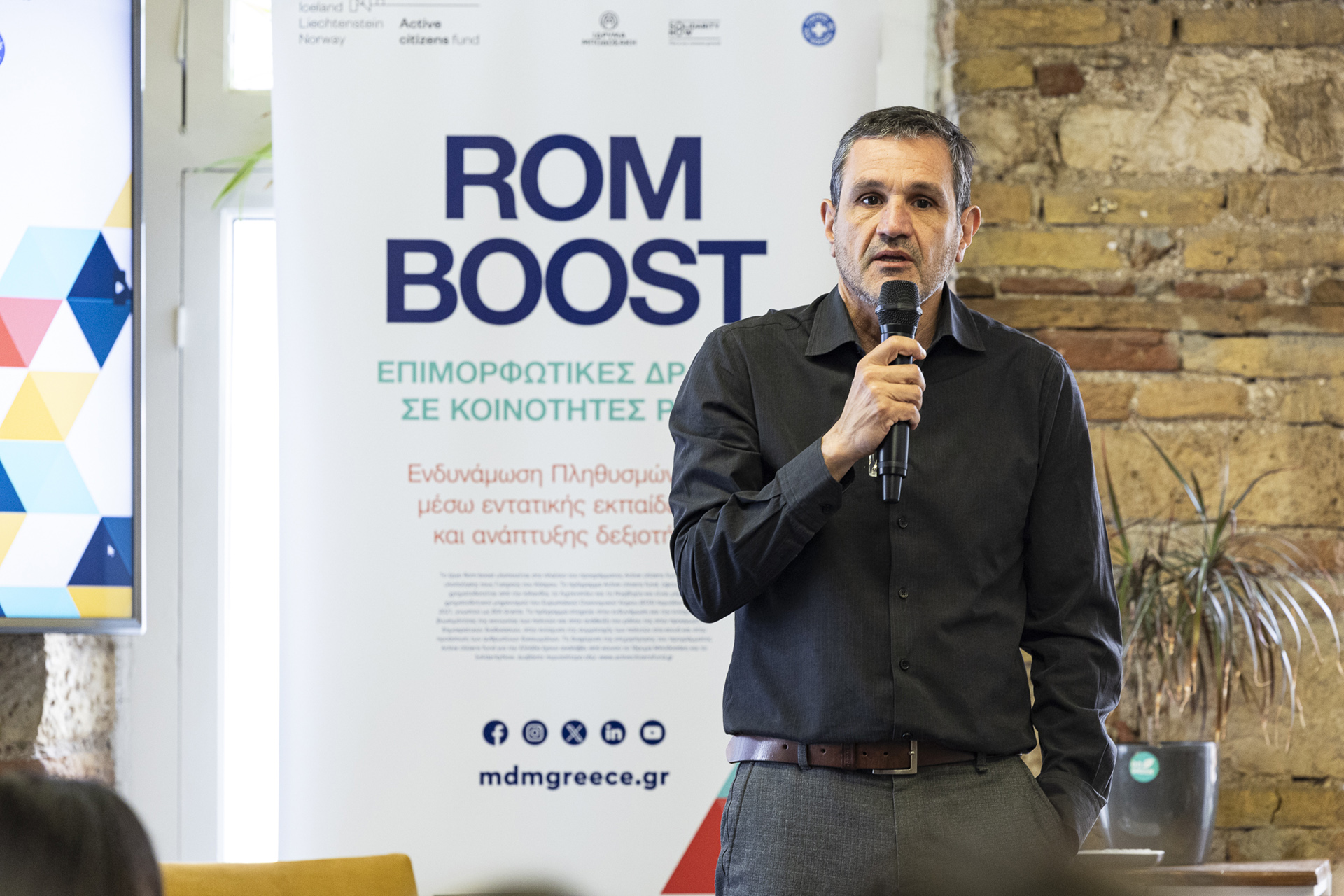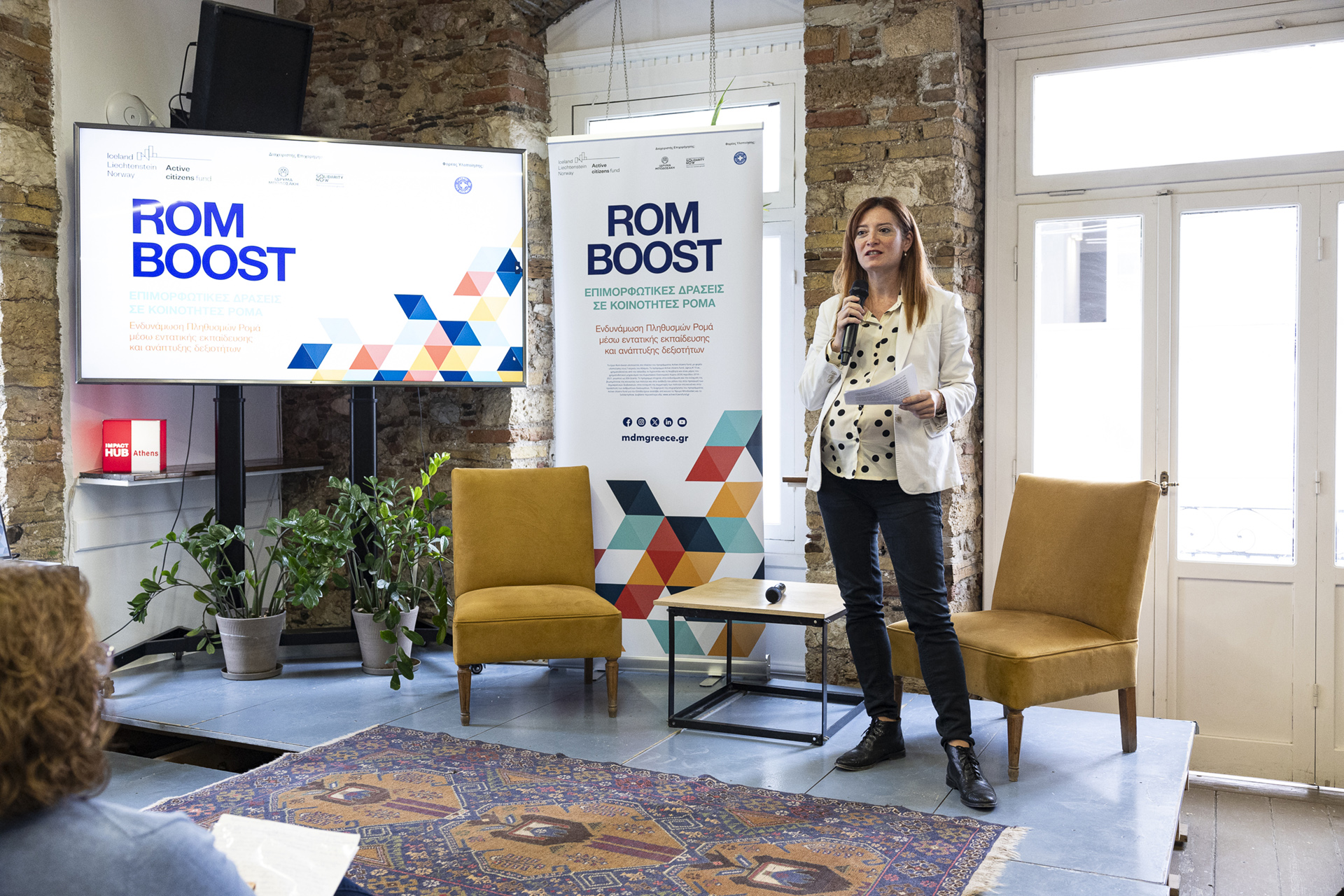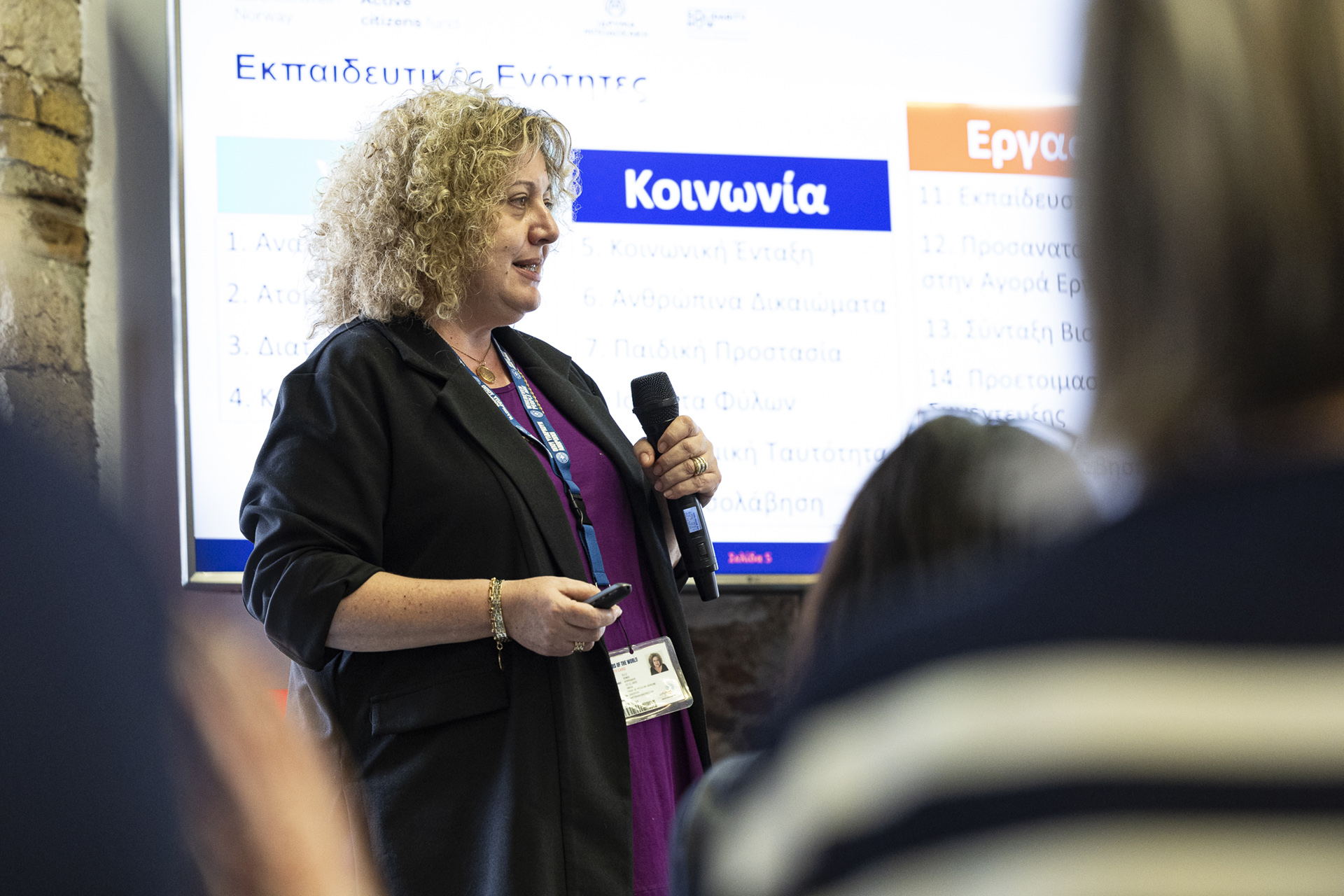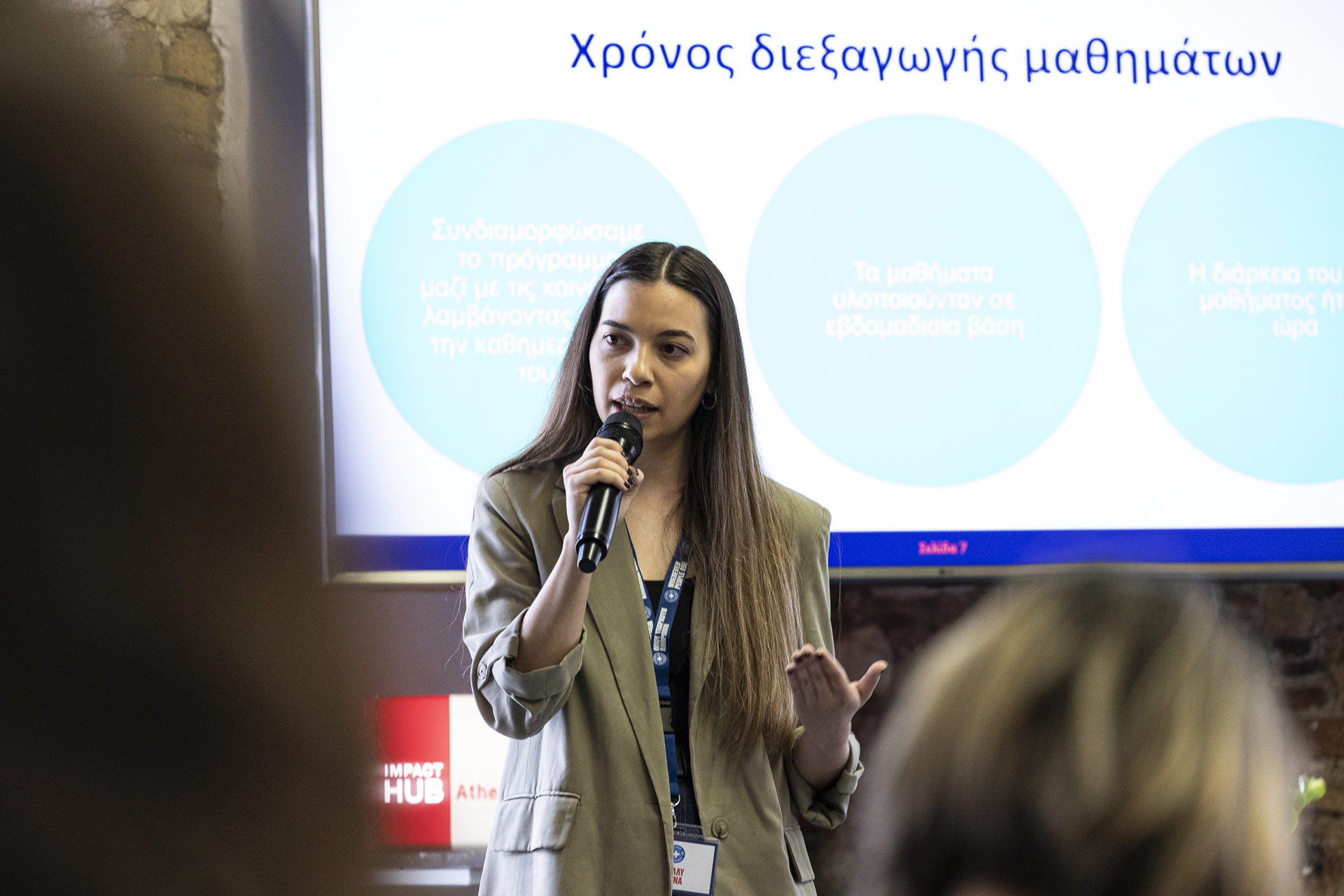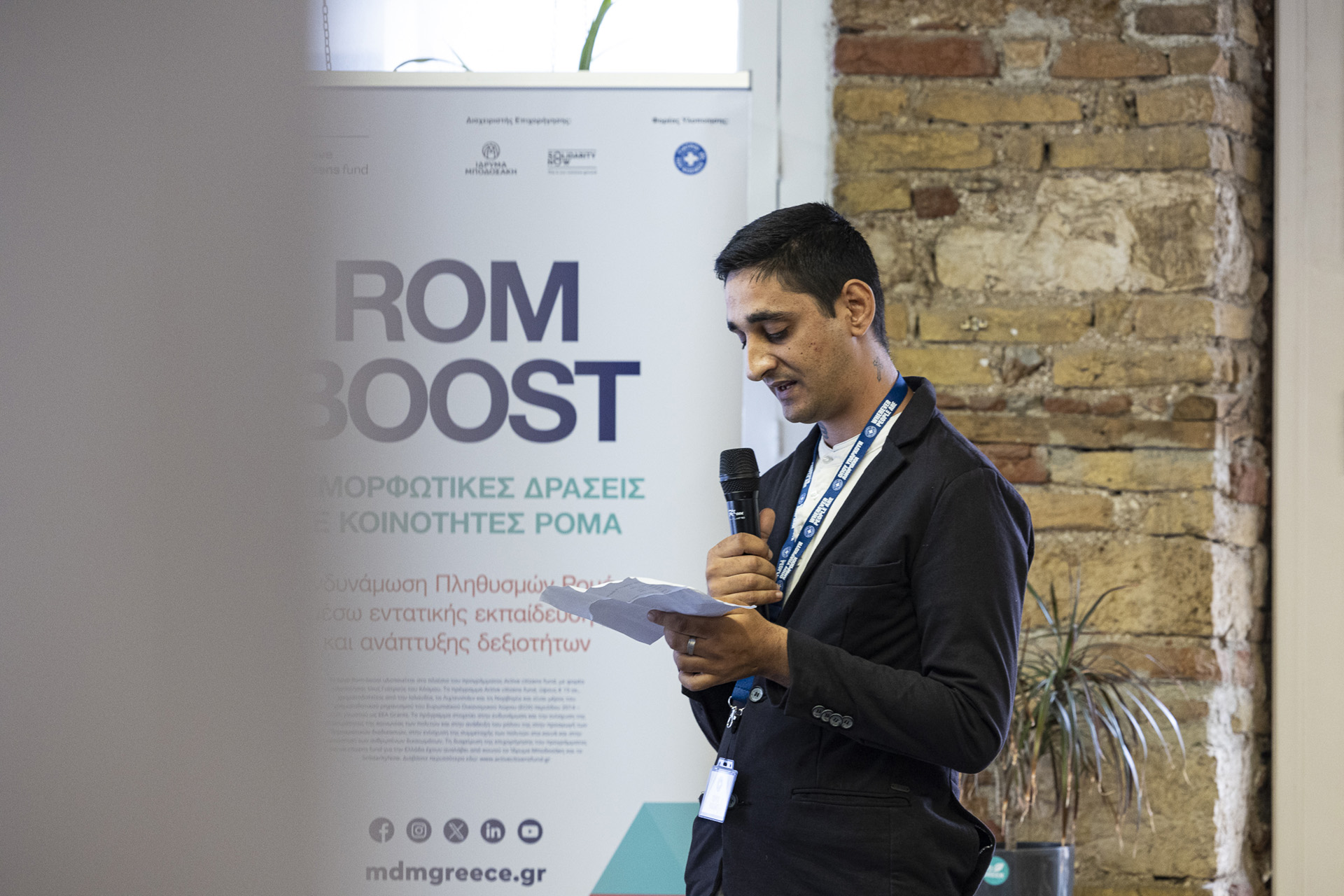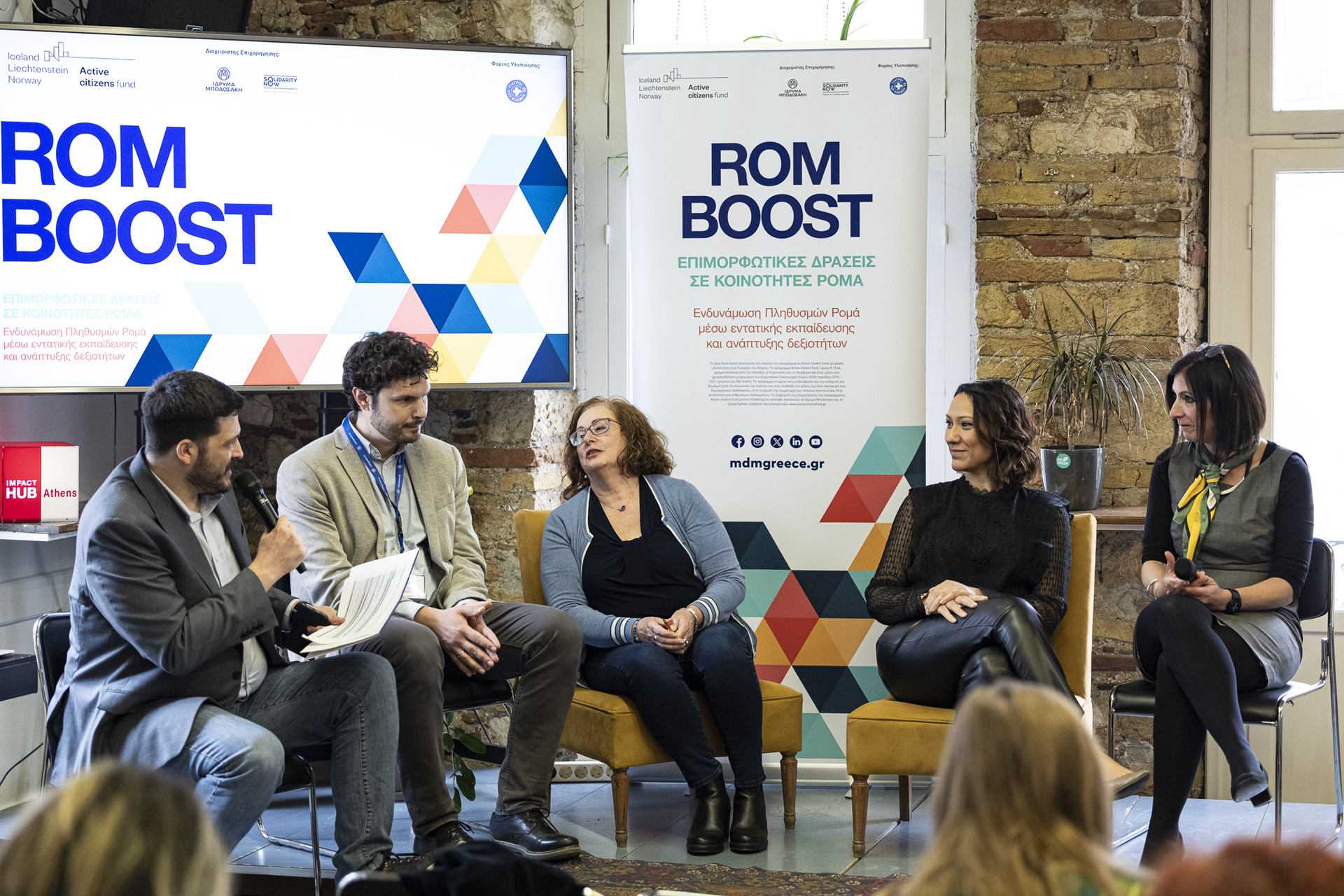
Empowerment and awareness for the Roma populations of Attica
In the presence of representatives of the State, Local Authorities, institutional bodies, representatives of civil society organizations and members of the Roma community, took place on Tuesday 23 April 2024 at Impact Hub Athens, the closing event of the project for the social and economic empowerment of Roma populations in Greece, entitled Rom-boost – Educational actions in Roma communities, implemented by Médecins du Monde between September 2023 and this month in the Municipalities of Athens, Spata and Pallini-Geraka with funding from EEA Grants through the Active citizens fund programme, with grant manager the Bodossaki Foundation and SolidarityNow.
Using a combination of intensive training and skills development, the project, which is part of Médecins du Monde’s multi-year social action for the support and care of Roma in Greece, focused on the participation of the community itself in the formulation of public policies that affect it, so that its members become actors of positive change. This was pursued through three central pillars of training and awareness-raising: health, protection and advocacy. To this end, the project focused on educating adult Roma women and raising community awareness regarding basic rights and responsibilities, including education for all – children, youth and adults – covering the areas of health and hygiene, work and income generation.
“Through ongoing dialogue, awareness raising and participatory actions, we are optimistic about empowering young Roma towards a better tomorrow and a better world”
The event was addressed by Mr Nikitas Kanakis, Vice-President of the Board of Médecins du Monde Greece, Mr Giorgos Stamatis, Member of the State Parliament and Member of the Parliamentary Committee for Equality and Non-Discrimination, Mr. Kostis Papaioannou, President of Technopolis of the Municipality of Athens and Director of the “Point for the study and confrontation of the extreme right”, as well as Mrs. Fay Koutzoukou, Deputy Director of the Active citizens fund Programme. Afterwards, Mrs Elli Xenou, Advocacy Officer of Médecins du Monde Greece and Project Manager of the Rom-Boost project, together with the members of the field team Kelly Schina, Project Coordinator, and George Nikolaou, Social Mediator of the Project, presented the actions and results of the Rom-Boost project.
This was followed by a thematic discussion on the integration of Roma in Greece, examples of good practices and issues of access to basic rights. In the context of the thematic discussion, Mrs Eleftheria Koumalatsou, Coordinator of the Task Force for the Social Integration and Empowerment of Roma from the General Secretariat for Social Solidarity and Fight against Poverty of the Ministry of Social Cohesion and Family, expressed her views and experiences, Mrs. Andriani Papadopoulou, Specialist of the Equal Treatment Circle of the Greek Ombudsman, Mrs. Christina Halilopoulou, Internationalist/Lawyer specializing in Social Policy Formulation and CEO of ALYSOS ALERT, and Mr. Anastasios Yfantis, Operational Director of Médecins du Monde Greece. The thematic discussion was moderated by the journalist Mr. Marios Aravantinos.
Nikitas Kanakis, Vice President of the Board of MdM-Greece
Mr. George Stamatis, Member of the State Parliament and Member of the Parliamentary Committee for Equality and Non-Discrimination
Mr. Kostis Papaioannou, President of Technopolis of the Municipality of Athens and Director of the “Point for the study and confrontation of the far right”
Mrs Fay Koutzoukou, Deputy Director of the Active citizens fund programme
At the opening of the event, Mr. Kanakis outlined the conditions of exclusion from the wider community experienced by most Roma populations across the country (unsuitable living conditions in inaccessible areas, severe or extreme poverty, food insecurity, limited access to public services, low level of education, unemployment and under-representation in the public sphere, lack of administrative documents), which end up reproducing a vicious cycle of degradation and wider social exclusion that includes and sustains introversion, social inequalities and ultimately delinquency as a negative coping mechanism, explaining, among other things, how Médecins du Monde focused on Roma women and adopted a bottom-up participatory approach in order to transfer necessary knowledge to Roma communities. Noting that “you educate the mother and you educate the family”, Mr Kanakis said that “through ongoing dialogue, awareness raising and participatory actions, we are optimistic about the empowerment of young Roma towards a better tomorrow and a better world“, referring to the “positive change that is slowly but surely coming”.
On his side, Mr.Stamatis developed the pillars of the National Strategy and Action Plan for the Social Inclusion of Roma 2021-2030, which, as he stressed, requires mutual cooperation, with Mr.Papaioannou focusing, apart from the pervasive racism in society, on systemic racism in state institutions, while Mrs.Koutzoukou described the existing needs covered through the essential solutions supported by the Active citizens fund Programme.
EXAMPLES OF GOOD PRACTICES
In the discussion triggered by the Rom-boost project, Mrs.Koumalatsou spoke about the 25-member Task Force that, under the direction of the General Secretariat for Social Solidarity and Fight against Poverty and based on the approach “For Roma with Roma”, has been in the Roma communities for the last two and a half years, aiming to help ensure that policies concerning them meet the needs of each local community, among other things: “The Rom-Boost project has proven in practice that Roma communities both want and can participate equally in social life. As long as the right framework is in place to achieve this goal“.
In the context of the thematic discussion on the integration of Roma in Greece, Mrs Eleftheria Koumalatsou, Coordinator of the Task Force for the Social Integration and Empowerment of Roma from the General Secretariat for Social Solidarity and Fight against Poverty of the Ministry of Social Cohesion and Family, expressed her views and experiences, Mrs. Andriani Papadopoulou, Specialist of the Equal Treatment Circle of the Greek Ombudsman, Mrs. Christina Halilopoulou, Internationalist/Lawyer specializing in Social Policy Formulation and CEO of ALYSOS ALERT, and Mr. Anastasios Yfantis, Operational Director of Médecins du Monde Greece. The thematic discussion was moderated by the journalist Mr. Marios Aravantinos.
Ms Papadopoulou, on behalf of the Greek Ombudsman, spoke about the interventions of the state that should aim at eliminating the systemic exclusion of Roma. “One such intervention that can break down the wall of exclusion is education. Now, without any delay, inclusion of all Roma children – all ages of mandatory education – in school,” she said, calling for: “On the initiative of the state, all children from the camps should be tracked down and integrated into the school process“, with Mrs. Khalilopoulou overstating, while touching on the many challenges and good practices and existing opportunities for Roma populations.
WOMEN’S ROMA PARTICIPATION
The Operational Director of Médecins du Monde, Mr. Yfantis spoke about the effective completion of the project with the high participation of Roma women in the activities, focusing on the possibility of active participation and expression of the community, and especially of its most vulnerable members, who had the opportunity to exchange and co-construct views and positions on their rights that they hardly enjoy, while, from the issues of equality and equal treatment to the interaction with the public administration, he emphasized the fact of strengthening the self-confidence of these people so that “The next day should include even greater participation of communities, the voice is there and they have it, as they have the power“, Mr. Yfantis further stressed, underlining the common assumption that for meaningful change we need horizontal planning and vertical implementation of measures, without fragmentation, as well as collectively having as a guide to our action that whatever the question, the answer can only be the people.
